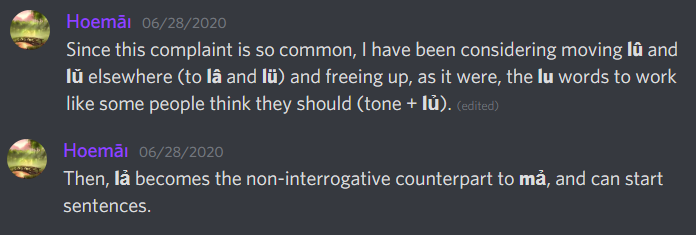More notes.
A word on relative clauses and binding
This isn’t news to everyone, but it hasn’t been written down in an easy-to-access place, so here it goes:
The gap in relative clauses is by default filled with hoa:
ke jỉo büa jí hóa
“the building which I inhabit [it]”
ke kủne düa jí chô súq hóa
“the dog that I know you like [it]”
But Toaq has also has a powerful general binding system which employs animacy-based pronouns combined with a verbatim repetition fallback, and these can be used in place of hoa:
ke jỉo büa jí máq
“the building which I inhabit [it]”
ke kủne düa jí chô súq hó
“the dog that I know you like [it]”
ke jỉo büa jí jío
“the building which I inhabit [the building]”
Not only are ho and maq etc. shorter than hoa, this option is also helpful when you have multiple relative clauses nested within each other:
ke kủne düashao jí mâ nỉe hó jío chö hó (kúne) máq (jío)
“the dog which I wonder whether it (the dog) is in the building which [it (the dog)] likes [it (the building)]”
Nevertheless, hoa is still useful as a default or when a personal pronoun or verbatim reference would be inconvenient to use (for instance, due to an intervening noun phrase).
Use of “pa” is discouraged
I don’t use pa, but I know some people still use it occasionally. However, it is likely not going to remain part of canonical Toaq. It is, possibly despite all appearances, a word which introduces a lot of hidden complexity for too little gain. Toaq is a VSO language, and it already has a topicalization mechanism in bı.
| Discouraged | Recommended |
| Jí pa kảqgaı súq | Kảqgaı jí súq |
| Sa pỏq pa bủ dủa dê hó | Sa pỏq bı bủ dủa hó dê hó |
Various re-assignments
✓ The terminator ceı is now cy.
✓ A change that I already hinted at over a year ago:

lû is now lâ. The -wh counterpart to mả is normally null, but lả is its non-null allomorph:
Mả chủqkuaı súq moq?
“Are you hungry?”
Dủa jí mâ chủqkuaı súq da.
“I know whether you are hungry.”
Ø Chủqkūaı súq da.
Lả chủqkuaı súq da.
“You are hungry.”
Dủa jí lâ chủqkuaı súq da.
“I know that you are hungry.”
Firstly, this is to show that ma and la are the same POS.
Secondly, you can use this POS to start a new sentence, even when the previous sentence has no overtly marked illocution:
Tỉ sa hảq. Mả chủqkuaı súq moq?
“There’s some food. Are you hungry?”
Shỏ nủokuaı jí. Lả tảofa nủo jí ba.
“I (am) get(ting) tired. I should go to sleep.”
Also, both mả and lả could be pronounced with ![]() before, but this will require a bit more care with the new tone system (don’t use the low tone variant after a falling tone).
before, but this will require a bit more care with the new tone system (don’t use the low tone variant after a falling tone).
Relative clauses start with lä instead of lü (ke kủne jäı hó = ke kủne lä jảı hó)
✓ lu now always binds hoa and no longer has lexical tone.

Thoughts:
— A word on relative clauses and binding —
Cool! I knew about the verbatim backrefs for relative clauses, but I didn’t know about pronoun backrefs for them. It makes a lot of sense, though — the variable simply gets bound quickly enough that it’s “already ready to be referenced” by all the normal mechanisms.
Also nice to see a fresh confirmation of the fact that pronouns even work like this. I wonder what bare hó will do when there’s nothing to refer back to? I know t2 in general refers to implicit ke-bindings in the prenex, but ke hỏ seems off. One thought I had is that pronouns would simply not be usable in this way, which at first made me proactively sad as there’s something “cute” about being able to just say Sủaq hó, but then I remembered that short words like réq often basically take the role of pronouns anyway, and figured I could just make Sủaq réq the cute thing.
I’ll be curious to see where and how the line is drawn between animate/inanimate/abstract predicate slots (tua? dua? bua?? don’t feel obligated to decide now ^^), as well as how they work in cereal predicates (same thing here!).
— Use of “pa” is discouraged —
Victory.
— Various re-assignments —
Jủqkūaq ka. Mỏaq jí mû mẻanhō shô chỉaq jí júa pỏ shú lu na, sa pủıgīq söq chủı tuq güo shô chîaq jí sa pỏ zú da.
LikeLike
You may recall that pronouns are technically DPs, and that they come with t2 out of the box. If you use them with any other tone, it invokes a covert “jeı”:
hỏ = jẻı hó.
“ke hỏ” is indeed off. It is equivalent to “ke jẻı hó”, i.e., it doesn’t bind “ho” (which you can’t do).
LikeLike
Ah, yes! So that actually presumably allows some pretty creative uses of the word. “Kủaı jí lî ja pỏq bı, hỏ sa dẻ” to give a contrived example.
LikeLike